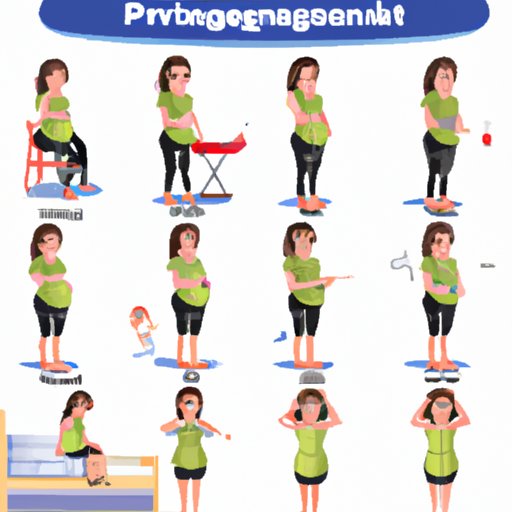
When Can Pregnancy Symptoms Start?
Learning about early pregnancy symptoms can be an important step in preparing for motherhood. Some women may experience symptoms as early as a few days after conception, while others may not experience any symptoms until several weeks into their pregnancy. Understanding the timing of early pregnancy symptoms can help women recognize when they may be pregnant and make informed decisions about their health.
Early Pregnancy Symptoms: What to Expect in the First Trimester
The first trimester of pregnancy is a critical period of development for the baby and can be a time of significant physical and emotional changes for the mother. Some of the most common early pregnancy symptoms include:
- Morning sickness – nausea and vomiting that may occur at any time of the day
- Extreme fatigue
- Frequent urination
- Breast tenderness
- Food cravings or aversions
These symptoms typically start around 4-6 weeks after the last menstrual period, which is when most women realize they are pregnant. However, some women may experience symptoms earlier or later than this time frame.
Surprising Signs of Pregnancy: Symptoms You Might Not Expect
While the symptoms listed above are typically the most commonly recognized signs of early pregnancy, there are other less-known symptoms that may occur as early as the first few weeks of pregnancy. These include:
- Nosebleeds
- Acne
- Constipation
- Mood swings
Recognizing these symptoms is important because they can be indicative of early pregnancy and may prompt women to take a pregnancy test or seek medical advice.
How to Tell if You’re Pregnant: Recognizing Early Signs and Symptoms
Early pregnancy symptoms can be mistaken for premenstrual symptoms, which can make it difficult for women to determine if they are pregnant. Some tips for recognizing early pregnancy symptoms include:
- Keeping track of menstrual cycles and paying attention to any changes or missed periods
- Taking note of changes in appetite, mood, and energy level
- Using at-home pregnancy tests to check for the presence of human chorionic gonadotropin (hCG) in urine, which is a hormone produced during pregnancy
It’s important to be aware that early pregnancy symptoms can be similar to premenstrual symptoms, but they may be more severe and persist for longer periods of time.
The Role of Hormones: Understanding When Pregnancy Symptoms Start
The hormonal changes in the body play a significant role in causing different symptoms to start during early pregnancy. The body begins producing hCG soon after a fertilized egg attaches to the uterine lining, which can cause more noticeable symptoms. Increased levels of estrogen and progesterone also contribute to early pregnancy symptoms such as fatigue, breast tenderness, and mood swings.
While every woman’s experience with pregnancy is unique, certain hormones and other factors affect the timing of early pregnancy symptoms. Understanding these changes can help women recognize when they may be pregnant and take appropriate action.
Managing Early Pregnancy Discomfort: Coping with the Symptoms
Although early pregnancy symptoms can be uncomfortable and challenging to manage, there are strategies that women can use to make the process easier. Some of these strategies include:
- Eating small, frequent meals to help ease morning sickness
- Taking naps or rest breaks whenever possible to combat fatigue
- Engaging in regular exercise or relaxation activities such as yoga to reduce stress and promote overall health and wellness
These strategies can help women cope with the physical and emotional changes of early pregnancy and stay comfortable during this critical period of development.
Pregnancy Symptoms: A Week-by-Week Breakdown
The symptoms experienced during early pregnancy may evolve and change over time. A general week-by-week breakdown of early pregnancy symptoms is:
- Week 1-4: Missed period, fatigue, and tender breasts
- Week 5-8: Nausea and vomiting, frequent urination, and food cravings or aversions
- Week 9-12: Dizziness, headaches, and increased hunger
While these symptoms are general and may vary among different women, it can be helpful to be aware of the timeline of early pregnancy symptoms and when to expect them.
Conclusion
Knowing when pregnancy symptoms can start is an important part of preparing for motherhood. Early pregnancy symptoms can be challenging to cope with, but understanding the signs and symptoms of pregnancy can help women stay healthy and comfortable during this critical period of development.
If you think you may be pregnant or are experiencing early pregnancy symptoms, it’s important to seek medical advice and care. Your doctor or healthcare provider can help you manage your symptoms and ensure that you and your baby are healthy throughout your pregnancy.




